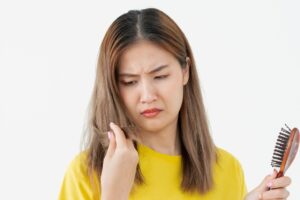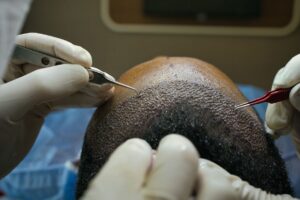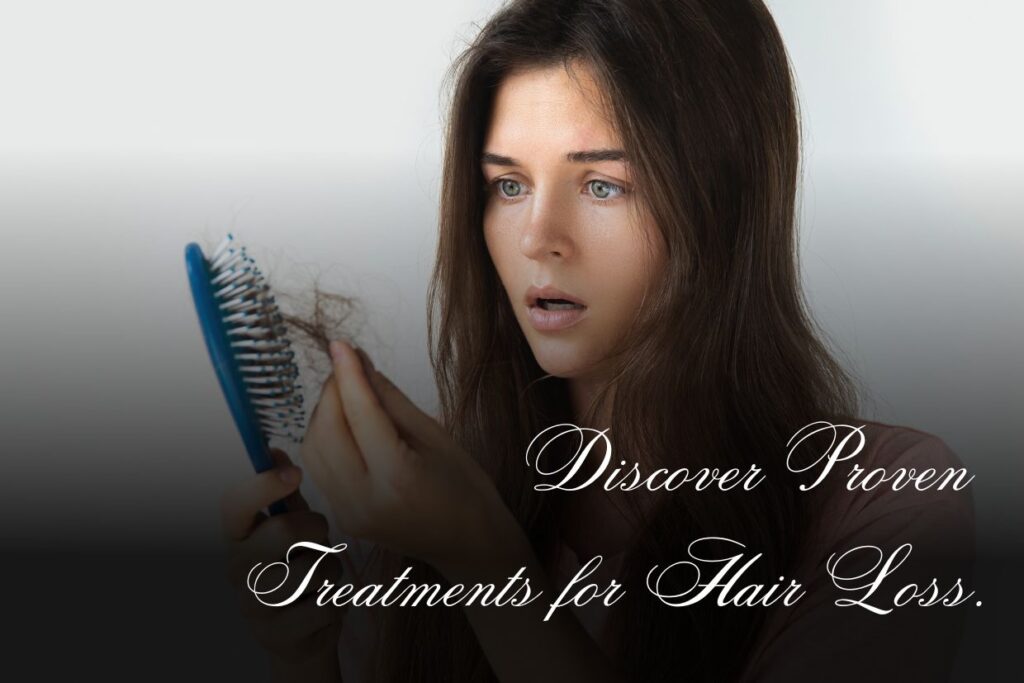Regardless of gender or age, hair loss is a widespread issue. It is experienced by a large number of individuals all over the world. This condition can severely impact one’s confidence and sense of self-worth. That can lead to discomfort and self-consciousness. As we all know, hair is considered a vital aspect of a person’s body and image, and thus, hair loss is a sensitive and challenging problem for most people.
Is hair loss normal? Yes, hair loss is normal. It is a natural process that occurs in the growth cycle of hair. It’s common for an individual to shed between 50 to 100 hair strands in a day. Nonetheless, hair loss is quite normal, but when it reaches a certain level, it becomes concerning and may be due to some health condition. It is important to know the causes of hair loss to control it.
There are a multitude of factors that cause hair loss, such as stress, poor diet, genetic predisposition, hormonal fluctuations, and diseases. Androgenic alopecia, or male or female pattern baldness, is an example of a hereditary disease that occurs in both genders. Other causes are hormonal fluctuations related to pregnancy, menopause, thyroid disorders, severe stress, and poor nutrition.
In this ultimate guide, you will learn about the effective treatments for hair loss that have been supported by scientific evidence and clinical studies. The treatments that are included vary from simple prescriptions and dietary changes to complex surgeries. Knowing these options will help you make the right decision in dealing with hair loss.
We will delve into different categories of treatments.
- Medications: Legal drugs such as those approved by the Food and Drug Administration and other prescription drugs.
- Lifestyle Changes : Diet changes, stress reduction, and the treatment of the scalp.
- Medical Procedures : Hair transplant, low-level laser therapy and PRP therapy.
It is crucial to note that the information provided should not replace professional medical advice from a doctor or dermatologist. Hair loss is a common problem, and it can be caused by different factors; therefore, it is advisable to consult a healthcare provider for a proper diagnosis and treatment plan. Individual consultations guarantee that you will be prescribed the best treatment for your case that will not harm you.
Understanding Hair Loss: Types & Causes.
To start with the treatments for hair loss, it is essential to understand what exactly hair loss is. Hair loss can be classified into various forms. One should understand them to determine the right treatment for their hair loss.
Different Types of Hair Loss.

Androgenic Alopecia
This is commonly known as male or female pattern baldness, which is a genetic disease that is most prevalent in the community. It is usually manifested as a balding of the hairline and thinning of hair on the top of the head in males and thinning or a widening of the part in females.
Telogen Effluvium
This type of hair loss is usually experienced for a while following a stressful event, an illness or hormonal changes. More hair loss occurs when hair follicles enter the shedding phase before they should, resulting in more hair loss.
Alopecia Areata
A disorder that causes bald patches on the head and other body parts when the immune system targets hair follicles.
Traction Alopecia
Hair loss is caused by the tension that is placed on hair through pulling or even through the use of tight hair accessories.
Causes of Hair Loss.
Several factors contribute to hair loss. They are,
Genetics
Genes do play a role in the development of androgenetic alopecia, as people with a family history of hair loss are likely to develop the condition.
Hormonal Changes
Hormonal changes such as during pregnancy, menopause, and thyroid issues are some of the causes of hair loss.
Medical Conditions
Some diseases like lupus, diabetes, and anaemia are other causes of hair loss.
Medications
Some of the drugs that are used in treating cancer, arthritis, depression and high blood pressure can lead to hair loss.
Stress
Any form of physical or emotional stress can lead to telogen effluvium.
Nutritional Deficiencies:
Deficiency in some nutrients, such as iron, vitamin D and protein, leads to hair loss.
Consulting The Doctor for Treatments for Hair Loss.

Importance of Medical Consultation.
It is vital to seek the help of a doctor or dermatologist to get a proper diagnosis of the cause of hair loss as well as the right treatment plan. The reason for this is that it is always possible to provide the patient with a treatment that corresponds with the diagnosis that has been given.
When to see a Doctor.
When should one consult a doctor for hair loss? If you see your hair falling out suddenly, in small patches or a lot, or if you feel any pain or itchiness, go see a specialist. The issue can be solved at an early stage of development if consultation is done at this stage.
Diagnostic Tests.
Doctors may perform various tests to determine the cause of hair loss.
Blood Tests– Blood tests diagnose other conditions that may be causing symptoms, such as thyroid disorders or deficiencies in nutrients.
Scalp Biopsy– It is a biopsy in which a few hairs with their roots are pulled out to assess the condition of the follicles.
Light Microscopy– Studying the hair shafts to determine possible disorders.
Medications for Hair Loss.
Medications are considered to be an important component of therapies for hair loss. Although this section gives an insight into the topic, it is not a recommendation for medical advice.
FDA-Approved Medications
Minoxidil: A non-prescription topical solution that is applied to the scalp, minoxidil works by increasing the activity of hair follicles. It comes in different concentrations and preparations. The possible side effects are skin irritation on the scalp and the production of hair in other areas of the body that is not desirable.
Finasteride: An oral medication mainly for male patterned hair loss, finasteride is effective because it prevents the hormone that leads to the shrinking of hair follicles. It can reduce hair shedding and help regrow hair. Possible side effects include impotence and elevated prostate cancer risk.
Other Medications
Spironolactone: This drug used in women is primarily prescribed for other purposes but inhibits some chemicals that lead to hair loss. It is often used together with other therapies, and it can only be obtained with a doctor’s prescription.
Hair Loss Treatments & Procedures.

Several advanced procedures and treatments for hair loss can effectively address the loss of hair:
Hair Transplants.
Hair transplants are done by relocating hair follicles from a region with high density to a region with low density. This surgical procedure has long-lasting effects, but it is costly, and one has to take time off to heal.
Low-Level Laser Therapy (LLLT).
This is a painless procedure that involves the use of red light to encourage hair follicles to grow. It is non-invasive and can be carried out at home or a clinic.
Platelet-Rich Plasma (PRP) Therapy.
PRP therapy is a process where the patient’s blood is taken, and the platelets are concentrated and then injected into the scalp to promote hair growth. It is not very painful, but several treatments may be needed to achieve the best outcome.
Additional Considerations
Aside from medications and treatments for hair loss, here are some alternatives to consider for maintaining healthy hair: Aside from medications and treatments for hair loss, here are some other options to consider for maintaining healthy hair.
Wigs and Hairpieces: For those who cannot or do not want to seek medical treatment, wigs and hairpieces are the quickest way to cover baldness. The following non-surgical procedures are very effective in improving one’s looks and thus increase self-esteem.
Managing Expectations: The goals and expectations should be realistic because hair regrowth treatments may not work the same for everyone. One should be patient, and having moderate expectations will ensure that one gets to be satisfied with the results.
Stress Management: Stress is one of the causes of hair loss. Stress causes diseases such as telogen effluvium, in which hair follicles are put to rest, resulting in more hair loss. To counter this effect, stress-reduction techniques should be adopted in the workplace.
Yoga and Meditation: Activities such as yoga and meditation can reduce stress, help the mind to relax and improve the health of an individual and their hair.
Exercise: A healthy exercise regime will help one’s mood and also assist in reducing stress hormones such as cortisol, thus preventing stress-related hair loss.
Scalp Health: The health of the scalp is very important when it comes to hair growth. A healthy scalp is one that is free of dandruff and other forms of buildup that could harm the hair follicles.
Gentle Cleansing: It is recommended to use mild shampoos and conditioners that will not harm the scalp but effectively remove the dirt. Do not wash too often to avoid stripping the skin of natural oils and causing dryness and itching.
Avoiding Harsh Styling Practices: Heat can cause harm to hair; therefore, limit the application of heat, such as blow dryers, straighteners, and curling irons. Use milder treatments, and do not put your hair into tight styles that put pressure on it and lead to splitting.
Regular Scalp Massage: Stimulating the scalp by massaging helps improve the blood flow in the area and, therefore, improves hair growth. When performing the massage, it is also advisable to use oils such as rosemary or peppermint as they act as hair growth stimulants.
Hydration: Water is vital for the body and hair, and one should ensure that one takes enough water to help grow one’s hair. Sufficient water intake ensures that the scalp remains moist and does not dry up, causing brittleness in the hair.
By incorporating these lifestyle changes, you can create an environment conducive to healthy hair growth. Combining these habits with proven treatments for hair loss can offer a comprehensive approach to managing and reversing hair loss. Always consult a healthcare professional to tailor these lifestyle changes to your specific needs and ensure the best outcomes for your hair health.
Conclusion
In conclusion, there are many treatments for hair loss. They are aimed at treating the root of the problem and the specific needs of the patient. These hair loss treatments include medical treatments, surgical treatments, along with other treatments. Topical solutions and oral drugs can be used to address hormonal issues or promote hair growth and can be effective in halting or reversing hair loss. Dietary habits, stress levels, and hair care practices are among the most important factors that affect hair health. For those who want to achieve more remarkable changes, there are more complex operations, such as hair transplantation or laser treatment.
In this case, it is always advisable to consult a health care provider, a physician, or a dermatologist to be advised on the most suitable treatments for hair loss, depending on the individual’s condition. This means you are provided with the best treatment that suits your condition.
When you take your time to analyse these various treatments for hair loss, you will be able to develop a proper plan to help you deal with your issues. Proper management and even possible reversal of hair loss can boost self-esteem and self-confidence. Therefore, it improves the quality of life.


